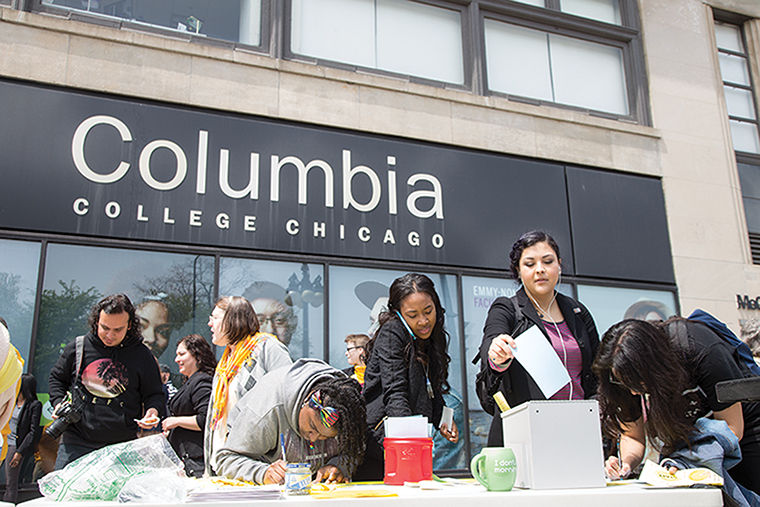US of CC in negotiations for new contract
US of CC members gathered outside the 600 S. Michigan Ave. Building on May 6 to pass out informational flyers and ask students to write about the impact the college’s staff has had on their education.
May 11, 2015
Members of the United Staff of Columbia College, the college’s staff union, assembled outside of the 600 S. Michigan Ave. Building on May 6 and passed out pizza slices to passersby, sending the message that Columbia’s staff do a lot for a small piece of the pie.
“Pizza with the Staff,” a spinoff of President and CEO Kwang-Wu Kim’s “Pizza with the President,” was an opportunity for staff to raise awareness about the issues most affecting them.
The union has been in negotiations with the college for a contract that officially expired in 2013 but was extended for one year, said JeeYeun Lee, secretary of the US of CC and director of Development and Communications for the Center for Community Arts Partnerships.
Lee said one of the key issues the staff is bargaining for in the new contract is a cost-of-living adjustment in salaries. Although the terms of the old contract hold while the union is in negotiations, every year without a cost of living increase is another year that the staff falls behind, she said.
The union is asking for a 5 percent cost-of-living increase for all staff, according to information from the US of CC.
“In our lives, all of the expenses continue to go up,” she said. “Every year that there isn’t an increase is a year that we’re actually spending more. Especially for staff who get paid the least, all of that makes a huge difference in just living.”
The US of CC is also asking for the college to hold the line on benefits and not implement any increases to health costs without salary increases.
Lee said the union feels it is unfair to ask staff to bear the increasing cost of health care benefits without a salary raise or regular cost of living adjustment.
“The college’s position right now is to try to increase member contributions [to health care benefits] as opposed to the school picking up more of the bill,” said Nick Hoeppner, president of the US of CC and engineer in the Radio Department.
Additionally, the union is asking the college to put an end to layoffs, increase budget transparency and cut high-paid administrative positions.
Joan McGrath, administrative assistant to the chair of the Cinema Art + Science Department and former membership chair of the US of CC, was one of the staff members who initially organized the union.
She said it took three years to negotiate the union’s first contract in 2009 and since then, the staff has realized that parts of the contract need to be strengthened.
“Our wages have really been stagnant,” McGrath said. “What I’m making today is really—if it were adjusted—pretty much what I was making in the 1990s. It’s important for us to try to keep up with the cost of living and we haven’t been able to do that.”
According to a statement provided by the college, Columbia does not comment on specific issues outside of negotiations.
“Until an agreement is reached, the college continues to negotiate in good faith and engage in productive discussions with the US of CC bargaining unit and its representatives on these matters,” the statement said.
Lee said a lot of the US of CC’s fight is not only about salaries or health insurance, but also about recognition and respect. She said a great deal of the college’s language revolves around the quality of teaching and courses, which is legitimate, but there is little mention of staff contributions.
“Staff literally are the people who come in and turn the lights on and deliver the mail and staff the facilities, as well as [facilitate] other kinds of experiences that make student experiences here on campus better,” she said.
At “Pizza with the Staff,” US of CC members asked students to write about the impact that staff has had on their education. The goal of this is to raise some visibility for the importance of staff in the everyday operations of the college, Lee said.
“We don’t really mind being sort of the glue, but we want to be respected,” McGrath said. “We want people to realize that they couldn’t run this place without us.”
The US of CC released a survey last month asking staff members what they would be willing to do in order to negotiate for a fair contract.
While some of the options included informational picketing, wearing buttons and potentially going on strike, Hoeppner said the US of CC has no formal affiliation with the SaveColumbia coalition.
“At this time, the executive committee of the US of CC has felt that we’re not going to participate in the SaveColumbia coalition,” he said. “Our members are free to participate in the SaveColumbia activities if they choose to, and we’re not trying to discourage that in any way. However, we have not officially endorsed it.”
Aside from the “Pizza with the Staff” event, Lee said the US of CC plans to invite members of the staff to be observers during negotiation sessions with the administration.
The meetings are typically attended by the US of CC bargaining team: Bill Silver, the union’s Illinois Education Association representative, and representatives of the college including Terence Smith, special counsel for Labor Relations and Patricia Rios, associate vice president of Human Resources, according to Lee. The next meeting takes place on May 18.
“From the very beginning, from admissions all the way to [a student’s] commencement, that’s staff that is making that happen,” she said. “We just want to try to raise a little bit of visibility around that role we play.”








